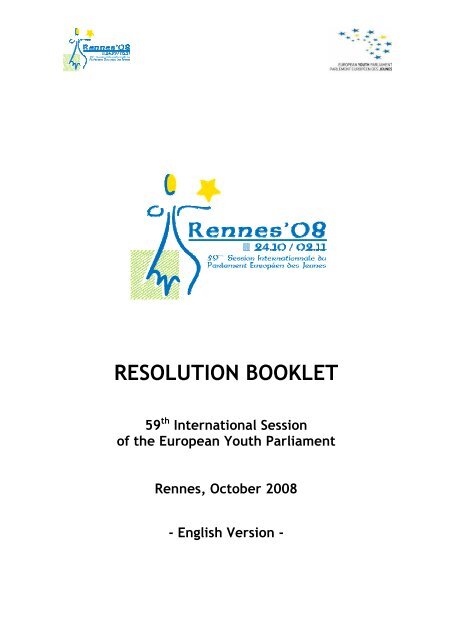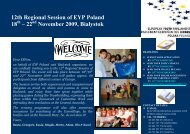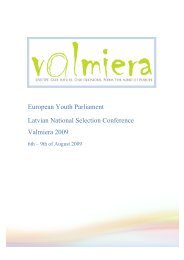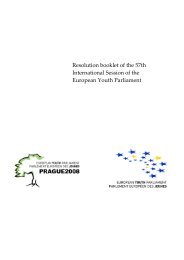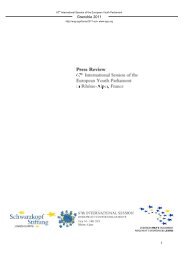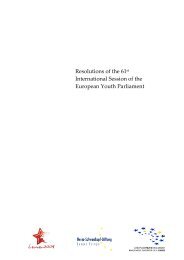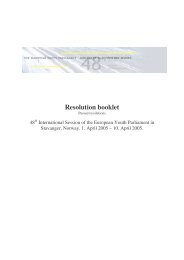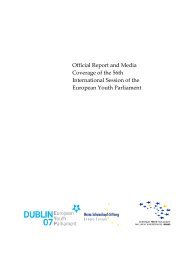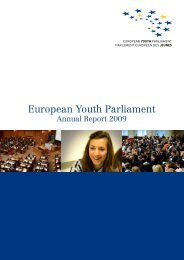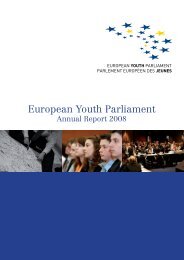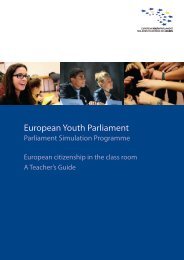RESOLUTION BOOKLET - European Youth Parliament
RESOLUTION BOOKLET - European Youth Parliament
RESOLUTION BOOKLET - European Youth Parliament
You also want an ePaper? Increase the reach of your titles
YUMPU automatically turns print PDFs into web optimized ePapers that Google loves.
<strong>RESOLUTION</strong> <strong>BOOKLET</strong><br />
59 th International Session<br />
of the <strong>European</strong> <strong>Youth</strong> <strong>Parliament</strong><br />
Rennes, October 2008<br />
- English Version -
This project has been funded with support from the <strong>European</strong> <strong>Parliament</strong>. The publication reflects the views only of the<br />
author, and the <strong>European</strong> <strong>Parliament</strong> cannot be held responsible for any use which may be made of the information<br />
contained therein.
<strong>RESOLUTION</strong>S PASSED BY THE 59 T H INTERNATIONAL SESSION OF THE<br />
EUROPEAN YOUTH PARLIAMENT<br />
- INCLUDED IN THIS <strong>BOOKLET</strong> -<br />
Resolution by the Committee on Employment and Social Affairs<br />
Resolution by the Committee on International Trade<br />
Resolution by the Committee on Environment, Public Health and Food Safety I<br />
Resolution by the Committee on Culture and Education I<br />
Resolution by the Committee on Environment, Public Health and Food Safety II<br />
Resolution by the Committee on Civil Liberties, Justice and Home Affairs<br />
Resolution by the Committee on Industry, Research and Energy<br />
Resolution by the Committee on Internal Market and Consumer Protection<br />
Resolution by the Committee on Agriculture and Rural Development<br />
Resolution by the Committee on Foreign Affairs<br />
Resolution by the Committee on Culture and Education III<br />
I<br />
FAILED <strong>RESOLUTION</strong>S AT THE 59 T H INTERNATIONAL SESSION OF THE<br />
EUROPEAN YOUTH PARLIAMENT<br />
Resolution by the Committee on Culture and Education II<br />
Resolution by the Committee on Economic and Monetary Affairs<br />
Resolution by the Committee on Constitutional Affairs<br />
Resolution by the Committee on Security and Defence
Rennes, 2008<br />
MOTION FOR A <strong>RESOLUTION</strong> BY<br />
THE COMMITTEE ON EMPLOYMENT AND SOCIAL<br />
AFFAIRS<br />
What measures does Europe need to take to address the effects of<br />
ageing populations on the labour market and social welfare systems?<br />
Submitted by: Milena Aleksieva (BG), Kaspars Burka (LV), Monica Ileana Dobre (AT),<br />
Anastasia Filippova (RU), Ganna Gradil (UA), Flora Kellerman (NL),<br />
Marius Linten (DE), Jonathan Maerker (SE), Ciara McGrath (IE), Maria<br />
Molvær Nesseth (NO), Jussara Nunes (PT), Clément Pit - - Claudel (FR),<br />
Nicola Solomou (CY), Cristina Mont Castro (Chairperson, ES)<br />
The <strong>European</strong> <strong>Youth</strong> <strong>Parliament</strong>,<br />
A. Taking into account the difficulties that Europe is facing regarding the consequences of<br />
an ageing population,<br />
B. Realising that a decreased birth rate within Europe will contribute greatly to a shift in the<br />
ratio of workers to pensioners,<br />
C. Fully aware that life-long learning and vocational training are essential to ensure the<br />
continuous employability of workers,<br />
D. Noting with regret the difficulty for employees to acquire training while employed,<br />
E. Deeply concerned that many people are forced to retire at a fixed age despite being both<br />
able and willing to continue working,<br />
F. Observing the current differences and the lack of communication between EU Member<br />
States regarding the effects of the ageing population on our society,<br />
G. Recognising the need for a change in attitudes towards work and the prejudices which<br />
exist between generations,<br />
H. Taking into consideration the uneven distribution of the <strong>European</strong> labour force and the<br />
difficulties for non-european citizens to enter the labour market;<br />
1. Encourages the EU to implement life-long learning educational programmes in order to<br />
enable a higher employability throughout all age groups through means such as:<br />
a) monthly courses assisted and funded by EU,<br />
b) young volunteers participating in programmes organised by the EU aiming at the<br />
education of older people in the usage of computer technology,<br />
c) providing materials for self education;<br />
2. Requests the introduction of certificates for all completed trainings and modernisation<br />
courses that are recognised by all employers within the EU;<br />
3. Calls for the abolishment of mandatory retirement ages in all EU member states;<br />
4. Calls for the adoption of the following measures aiming to encourage the elderly to extend<br />
their working period by:<br />
a) allowing a gradual and choice based retirement to the elderly,
Rennes, 2008<br />
b) providing benefits and subsidies for people both working and retired above the age<br />
of minimum retirement,<br />
c) providing working senior citizens with special insurance and medical support to<br />
promote healthy ageing;<br />
5. Urges the establishment of an Agency responsible for the Ageing Population (AAP)<br />
which:<br />
a) collects data on policies concerning the ageing population in different member states<br />
in a central database,<br />
b) conducts research on new methods to reduce the effects of ageing population and<br />
their implementation,<br />
c) designs public awareness campaigns and exchange programmes in order to<br />
promote a positive attitude towards the elderly as well as a more tolerant working<br />
environment;<br />
6. Strongly encourages all EU Member States to ensure their ‘family’ policies provide:<br />
a) the support of mothers by offering paid maternity leaves,<br />
b) childcare support offered both by the state and private companies,<br />
c) incentives for families with two or more children such as subsidies and tax<br />
reductions;<br />
7. Advises each Member State to consider its pension policy in accordance with the<br />
research conducted by the AAP;<br />
8. Further encourages the introduction of incentives and subsidies for unemployed<br />
workforce successfully re-entering the labour market;<br />
9. Calls for the implementation of the Blue Card system in the EU in order to ensure a<br />
constant flow of skilled workers into the EU in accordance with the demands of the<br />
<strong>European</strong> labour market;<br />
10. Urges governments of EU Member States to financially support companies hiring elderly<br />
employees.
MOTION FOR A <strong>RESOLUTION</strong> BY<br />
THE COMMITTEE ON INTERNATIONAL TRADE<br />
Rennes, 2008<br />
After Geneva: WTO, the impossible agreement? How can the <strong>European</strong><br />
Union contribute to conclude the Doha round in a more favourable<br />
direction to emerging countries without harming the interests of its<br />
member states?<br />
Submitted by:<br />
The <strong>European</strong> <strong>Youth</strong> <strong>Parliament</strong>,<br />
A. Conscious of the fact that the development of countries is directly linked to their trade<br />
agreements,<br />
B. Taking into consideration the reduced agricultural capacity of many developing countries<br />
and thus the need for flexibility and the “Special and Differential Treatment (SDT)”,<br />
C. Recognising the importance of finding a middle ground between the development of world<br />
trade and protecting the environment,<br />
D. Aware of the existence of anti-WTO organisations,<br />
E. Noting that:<br />
Magdalena Bieluk (PL), John Boström (FI), Emma Divers (GB), Jeremy<br />
Karp (FR), Lukáš Klíma (CZ), Lorenzo Losi (IT), Steliana Moraru (RO),<br />
Beril Tekelioglu (TR), Valeri Tritakov (BG), Spiros Zafiris (GR), Alexander<br />
Åström (SE), Klára Šebáková (Chairperson, CZ)<br />
i) poor quality goods enter the market,<br />
ii) concepts for products are often imitated by other manufacturers which remains a<br />
problem in the world-wide market,<br />
F. Taking into account the existence of non-democratic countries and the importance of<br />
defining their place in the GTS (Global Trading System),<br />
G. Emphasising the importance of improving the economies of developing countries focusing<br />
on the principle of equality,<br />
H. Bearing in mind the importance of the support of the United States of America to the<br />
WTO,<br />
I. Recognising the importance of the EU's help to developing countries in regard to the<br />
GTS,<br />
J. Alarmed by the Doha Round's failure to address the issues of security concerns and of<br />
the absence of an effective control in the GTS,<br />
K. Realising the importance of access to patented medicines;<br />
1. Urges developed countries to provide less developed countries with key products for fairtrade<br />
prices;<br />
2. Recommends that the WTO cuts trade barriers in agriculture, services and manufacturers<br />
by 33% by the year 2015 in accordance with the Doha Development Agenda (DDA);
Rennes, 2008<br />
3. Encourages the EU to set up an advisory body to help developing countries further their<br />
agricultural skills and improve their industry with the help of NGOs;<br />
4. Calls for an introduction of a grading certificate for those companies that wish to trade<br />
with the EU granting those companies lower tariffs;<br />
5. Invites the anti-WTO organisations to liaise with the WTO as consultative bodies;<br />
6. Calls upon the WTO to employ “Market Access” including rules for special and sensitive<br />
products and a safe-guard mechanism to protect developing countries from dips and<br />
surges in the market;<br />
7. Suggests that banks in Member States provide micro-loans to people in developing<br />
countries who wish to start their own business, hoping for an improved trade in return.
Rennes, 2008<br />
MOTION FOR A <strong>RESOLUTION</strong> BY<br />
THE COMMITTEE ON ENVIRONMENT, PUBLIC HEALTH<br />
AND FOOD SAFETY I<br />
From good intentions to action: saving biodiversity. How should the<br />
<strong>European</strong> Union act to accelerate the implementation of its action plan<br />
to halt the loss of biodiversity, in particular by better involving citizens<br />
and civil society?<br />
Submitted by: Alexander Ackerl (AT), Mícheál Callaghan (IE), Valeriia Cherednichenko<br />
(UA), Karl Fredrick Hiemeyer (NO), Arad Hosseini (SE), Paul Klarenbeek<br />
(NL), Marleen Mathiowetz (DE), Rebecca McSheaffrey (GB), Kristaps<br />
Ozolins (LV), Laura Pssalti (CY), Rebecca Smith (FR), Joana Traykova<br />
(BG), Ricardo Vasconcelos (PT), Stamos Tahas (Chairperson, GR)<br />
The <strong>European</strong> <strong>Youth</strong> <strong>Parliament</strong>,<br />
A. Defining the Action Plan for biodiversity as a set of objectives to halt the loss of<br />
biodiversity based on an assessment of its loss in the EU and globally,<br />
B. Explaining that the four main policy areas of the Action Plan are:<br />
i) biodiversity in the EU,<br />
ii) the EU and global biodiversity,<br />
iii) biodiversity and climate change,<br />
iv) the knowledge base,<br />
C. Deeply concerned by the continuing loss of biodiversity across Europe,<br />
D. Acknowledging that the loss of biodiversity is caused by environmental threats involving<br />
but not limited to:<br />
i) pollution,<br />
ii) climate change,<br />
iii) overharvesting of natural resources (i.e. overfishing),<br />
iv) habitat degradation,<br />
v) introduction of alien species,<br />
E. Noting that overexploitation of natural resources is resulting in Member States losing their<br />
cultural and national identity,<br />
F. Deeply disturbed by the lack of proper legislation in the following areas:<br />
i) discrepancies between EU policy and the policy of its Member States,<br />
ii) difficulties accessing information regarding EU policy,<br />
iii) measures of practically implementing the law,<br />
iv) sufficient incentives to create a more environmentally friendly economic policy,<br />
G. Recognising the need for transparency in the spreading of information about citizens’<br />
impact on biodiversity and their options for making more sustainable choices,
Rennes, 2008<br />
H. Aware of the fact that the different status of biodiversity in Member States means natural<br />
resources are exploited in varying ways affecting the following sectors:<br />
i) economic,<br />
ii) cultural,<br />
iii) ecological,<br />
iv) social,<br />
I. Alarmed by the ignorance among the general public to the threats of the rapid loss of<br />
biodiversity,<br />
J. Emphasising the central role of the environmentalist sector in the future economic<br />
development of the EU,<br />
K. Taking into consideration the necessity of securing <strong>European</strong> wildlife reserves to protect<br />
endangered species and prevent their extinction,<br />
L. Fully believing urban areas have a role to play in the protection of biodiversity through<br />
self-sufficient urban planning and sustainability in allotment schemes,<br />
M. Affirming the importance of the involvement of NGOs in the implementation of such<br />
programmes as the Action Plan for the Loss of Biodiversity by 2010,<br />
N. Welcoming the co-operation between the EU and the UN on protecting biodiversity and in<br />
particular the decision to prepare a post-2012 arrangement to fight climate change,<br />
O. Viewing with appreciation the success following releases of movies underlining the<br />
importance of stable ecosystems,<br />
P. Draws attention to the fact that donations from the public and private sector to save<br />
biodiversity are subject to tax breaks;<br />
1. Urges the creation of an international advisory board within the <strong>European</strong> Environmental<br />
Agency (EEA) consisting of experts and representatives to help states establish<br />
appropriate programmes that will:<br />
a) help resolve the issue of biodiversity loss in each specific country,<br />
b) act as an intermediate between governments and the EU;<br />
2. Calls for accelerated implementation of NATURA 2000 in new EU Member States;<br />
3. Requests an evaluative report on the success of implementing NATURA 2000 in each<br />
Member State in order to improve quality, efficiency and feedback in existing protected<br />
areas;<br />
4. Further recommends the introduction of a common policy guedelines for all nature<br />
reserve areas in the EU;<br />
5. Endorses the further development of captive breeding programmes and the reintroduction<br />
of species;<br />
6. Demands a limitation on further introduction of Genetically Modified Organisms (GMOs)<br />
until profound and extended research is carried out on the impact of such organisms on<br />
biodiversity and human health;<br />
7. Declares the need to find a compromise between the fishing industry and the<br />
preservation of the biological richness of the sea by:
Rennes, 2008<br />
a) emphasising the importance of small fishing communities in the Common Fisheries<br />
Policy,<br />
b) taking into account the rate at which certain species are caught,<br />
c) holding an urgent conference between Heads of State, representatives of the fishing<br />
industries and leading scientists on marine biology;<br />
8. Encourages all businesses to become more environmentally friendly by establishing an<br />
international co-operation between them that will provide the following incentives:<br />
a) tax cuts,<br />
b) preferential trade conditions;<br />
9. Endorses further transparency in the implementation of EU policies taken to stop the<br />
decline of biodiversity;<br />
10. Calls upon governments to implement policies that will assist citizens in reducing their<br />
daily consumption of energy;<br />
11. Invites the inclusion of governmental subsidies for projects that aim to halt the loss of<br />
biodiversity such as the Action Plan;<br />
12. Asks for the promotion and establishment of common EU programs such as:<br />
a) EU cleaning day, where the Member State is provided with supplies for citizens to<br />
clean their neighbourhood,<br />
b) an EU Wide Forum held by independent environmental organisations to inform and<br />
provide the possibility of interaction between the public and policy makers,<br />
c) civil sponsorship initiatives to preserve endangered species,<br />
d) volunteering campaigns to protect the habitat of endangered species;<br />
13. Declares the need for a new version of the Bali Roadmap directly tackling the issue of<br />
biodiversity;<br />
14. Calls for campaigns to promote public awareness via the media, on preserving<br />
biodiversity through measures such as saving energy aiming at people from different<br />
backgrounds.
Rennes, 2008
Rennes, 2008<br />
MOTION FOR A <strong>RESOLUTION</strong> BY<br />
THE COMMITTEE ON CULTURE AND EDUCATION I<br />
Concerns about press freedom: how can the EU ensure that this<br />
fundamental right of democracy is effectively guaranteed and respected<br />
throughout its borders?<br />
Submitted by: Octavia Bors (RO), Aude Durand (FR), Lydia Flynn (IE), Daan Janssens<br />
(BE), Anna Katkevica (LV), Karin Kraglund (NO), Pedro Ros Reina (ES),<br />
Dariia Skidan (UA), Jennifer Stewart (GB), Alexander ten Cate (NL), John<br />
Tsihritzis (GR), Ingrid Välk (EE), Manuel Weidmann (DE), Jamie Brown<br />
(Chairperson, IE)<br />
The <strong>European</strong> <strong>Youth</strong> <strong>Parliament</strong>,<br />
A. Convinced that freedom of speech and freedom of the press are fundamental rights and a<br />
necessity for successful democracies,<br />
B. Defining mass-media as a means of disseminating information to as many people as<br />
possible including, but not limited to:<br />
i) printed media such as newspapers, journals, newsletters,<br />
ii) websites and blogs,<br />
iii) television and radio networks,<br />
C. Regretting that current legislation concerning press freedom is not always respected,<br />
D. Further regretting that the <strong>European</strong> Court of Human Rights (ECHR) does not hold the<br />
final judgement in matters concerning press freedom and journalists' rights,<br />
E. Aware of the fact that the media is often influenced internally by those with vested<br />
interests seeking:<br />
i) political, personal and ideological gain,<br />
ii) financial and economic benefits,<br />
F. Alarmed by the use of violence and intimidation towards journalists in the EU and<br />
potential accession states as well as the occasional failure to protect these journalists,<br />
G. Strongly believing that media pluralism ensures press freedom and provides access to a<br />
variety of information sources, opinion and voices,<br />
H. Noting the lack of a common policy standard needed to create an environment in which a<br />
self-regulating media can function,<br />
I. Recognises the individual rights of Member States to have their own legislation<br />
concerning:<br />
i) freedom of speech,<br />
ii) hate speech and incitement to violence,<br />
iii) racial or religious discrimination,<br />
J. Fully aware of the continual growth of the internet,<br />
K. Noting with satisfaction the <strong>European</strong> Commission's objective to keep the internet as an<br />
open and censorship free zone,
Rennes, 2008<br />
L. Appreciating the work of independent journalistic organisations such as the Association of<br />
<strong>European</strong> Journalists (AEJ) in protecting journalists' rights,<br />
M. Emphasising the importance of education in public awareness of media pluralism and<br />
legislation concerning the press;<br />
1. Calls for a common standard agreement on press freedom which must be adhered to by<br />
all Member States including:<br />
a) a minimum number of independent media in relation to population in order to support<br />
a self-regulating media system,<br />
b) the prevention of mass media monopolies in accordance with existing anti-trust laws,<br />
c) the reduction of undue economic, legal and administrative pressure on journalists,<br />
d) the protection of journalists from physical intimidation, violence and persecution;<br />
2. Calls for the instigation of a special commission or agency to:<br />
a) define the common standard and advise on how to attain and maintain the standard,<br />
b) apportion appropriate funding to growing news enterprises in order to encourage<br />
media pluralism,<br />
c) assist states which fall behind the standards;<br />
3. Resolved to support approved independent media associations and watchdogs such as<br />
the AEJ and Reporters Without Borders (RSF), when requested and where possible;<br />
4. Urges Member States to continue allowing an international media presence and the<br />
continuation of uncensored internet access;<br />
5. Strongly recommends that Member States develop or encourage educational<br />
programmes where objective reasoning skills are taught alongside media studies in order<br />
to create an understanding of press freedom and pluralism;<br />
6. Authorises the ECHR to make the final judgement in matters concerning press freedom<br />
provided that the respective judicial processes have been exhausted;<br />
7. Accepts that journalists are only obliged to reveal their sources of information when they<br />
are ordered to do so by the ECHR.
Rennes, 2008<br />
MOTION FOR A <strong>RESOLUTION</strong> BY<br />
THE COMMITTEE ON ENVIRONMENT, PUBLIC HEALTH<br />
AND FOOD SAFETY II<br />
<strong>European</strong> environmental requirements and international trade: how can<br />
the <strong>European</strong> Union manage to defend a model of environmental<br />
excellence without harming the competitiveness of its companies or<br />
detracting from the openness of its economy?<br />
Submitted by: Artemis Anastasiou (CY), Rebecca Anselmi (IT), Julia Bingler (DE), Marta<br />
Brzosko (PL), Mariana Catarino (PT), Emelie Fernström (SE), Niek<br />
Houterman (NL), Julia Hug (FR), Masouras Ilias (GR), Il’mir Khasanov<br />
(RU), Heta Salovaara (FI), Ivelina Slavova (BG), Lacina Koné<br />
(Chairperson, FR), Samuel Sieber (President, CH)<br />
The <strong>European</strong> <strong>Youth</strong> <strong>Parliament</strong>,<br />
A. Deeply convinced that the EU has to establish concrete measures in order to achieve its<br />
environmental goals without harming its competitiveness by:<br />
i) taking into account existing measures aimed at the protection of the environment<br />
implemented by the EU such as the Kyoto Protocol or the United Nation Framework<br />
Convention on Climate Change (UNFCCC),<br />
ii) bearing in mind that these measures often are not effective enough,<br />
B. Believing that only simultaneaous development of the economy and the environment can<br />
assure the progress of humankind,<br />
C. Noting with concern the existence of various economic practices that harm the<br />
environment,<br />
D. Deeply disturbed by the lack of the attention given to environmental issues as a<br />
consequence of the economic crisis,<br />
E. Recognising the need for a compromise between open markets and protectionism,<br />
F. Realising that food crises both result from and influence environmental and economical<br />
factors,<br />
G. Deeply concerned by the predicted temperature rise of 6°C by 2100 that will have a<br />
devastating effect on the economy, society and the environment,<br />
H. Alarmed by the depletion of non-renewable energy reserves resulting in a constant rise in<br />
their prices,<br />
I. Agreeing with the EU’s proposal to increase the use of second-generation eco-fuels by<br />
10% until 2020;<br />
1. Calls upon the EU to develop and act as a role mode in the field of sustainable<br />
development;<br />
2. Believes that investments in the environment made today are a substantial investment in<br />
the future economy;
Rennes, 2008<br />
3. Affirms that balance between environmental protection and economical competitiveness<br />
can only be reached if a compromise is found between:<br />
a) EU policies and international policies,<br />
b) the responsibilities and actions of companies, governments and individuals,<br />
c) short-term and long-term interests;<br />
4. Suggests in accordance with the responsibility between companies and individuals:<br />
a) the use of notes on products produced within the EU proving their environmentally<br />
friendly capacity,<br />
b) the creation of a separate manual for all technical products containing<br />
comprehensive suggestions how to use the product in an environmentally friendly<br />
way;<br />
5. Recommends the creation of a new environmental programme to directly follow the Kyoto<br />
Protocol;<br />
6. Calls upon the EU to use its diplomatic influence in the World Trade Organisation (WTO)<br />
and further international organisations in order to involve other countries in:<br />
a) a coordinated and co-governed scheme to protect the environment,<br />
b) the enforcement of Clean Development Mechanism (CDM) through the EU and the<br />
WTO,<br />
c) a global Emission Trade Scheme (ETS);<br />
7. Calls for the EU to issue a special product label:<br />
a) informing customers of its production in line with EU environmental guidelines,<br />
b) lowering the price to both consumers and producers by offering a tax-cut on labelled<br />
products;<br />
8. Urges the creation of a pan-<strong>European</strong> institution that is made up of democratically elected<br />
members which:<br />
a) allocates the ETS credits to companies on an supranational scale,<br />
b) ensures companies follow environmental guidelines,<br />
c) promotes the use of the EU label in public using advertising means such as the<br />
media;<br />
9. Supports the WTO in its demand for a decrease in subsidies on agriculture;<br />
10. Approves, however, conditional agricultural subsidies in order to promote the<br />
implementation of environmentally friendly and efficient ways of production;<br />
11. Authorises a period of transition for companies to implement new efficient and<br />
environmentally friendly production methods in accordance with the conditional subsidies;<br />
12. Calls for subsidies for companies that research and develop new technologies increasing<br />
the means of efficient and non-pollutant production;<br />
13. Urges for the creation of an independent EU forum opened to everyone:<br />
a) enabling the sharing of ideas in the area of new technologies and new ways of<br />
transporting within the EU,<br />
b) promoting cooperation, transparency and discussions amongst its members;
Rennes, 2008<br />
14. Supports organisations investigating and evaluating the efficiency and the environmental<br />
friendliness of companies;<br />
15. Supports initiatives such as the <strong>European</strong> Business Award for environmentally friendly<br />
enterprises in order to promote environmental excellence.
Rennes, 2008
Rennes, 2008<br />
MOTION FOR A <strong>RESOLUTION</strong> BY<br />
THE COMMITTEE ON CIVIL LIBERTIES, JUSTICE AND<br />
HOME AFFAIRS<br />
From the ‘return’ directive to the Cannes agreement on a <strong>European</strong><br />
immigration and asylum pact: how can the <strong>European</strong> Union achieve the<br />
establishment of a common policy on these issues in consultation with<br />
all its stakeholders and without jeopardising its founding values?<br />
Submitted by: Ioana Laura Alecsiu (RO), Mareike Bojer (DE), Meric Gurgen (TR), Amy<br />
Hendry (GB), Teona Lavrelashvili (GE), Jan Kaiser (CZ), Emma Murtonen<br />
(FI), Alex Nompilakis (GR), Katarzyna Paszkowska (PL), Claudia Resmini<br />
(IT), Angelica Richtner (SE), Ladina Schubert (CH), Hessam Mobasser<br />
(Chairperson, BE)<br />
The <strong>European</strong> <strong>Youth</strong> <strong>Parliament</strong>,<br />
A. Realising that 'The Return Directive' has controversial content including:<br />
i) the possibility of detaining illegal immigrants for a period up to eighteen months which<br />
is widely regarded as an infringement on human rights,<br />
ii) that the four week notice given for voluntary departure allows insufficient time for<br />
preparation,<br />
iii) the refusal of the UK, Ireland and Denmark to opt into the directive,<br />
B. Regretting the current lack of a common EU policy regarding immigration,<br />
C. Fully aware that the 'Asylum Pact' stresses the need to consider individual Member<br />
State's circumstances,<br />
D. Alarmed by the increase of xenophobia in Member States due to the lack of integration of<br />
immigrants into civil society,<br />
E. Noting with great concern that the lack of partnership between host countries, countries of<br />
origin and NGOs,<br />
F. Believing that NGOs play an important role in ensuring the protection of rights of<br />
immigrants,<br />
G. Noting with regret that there is a considerable difference in the quality of life between<br />
those living in EU Member States and those living in the countries of origin,<br />
H. Bearing in mind the difficulty of monitoring illegal immigration,<br />
I. Concerned with the lack of information for prospective immigrants regarding legal routes<br />
of immigration,<br />
J. Fully believing that the possibility of unregistered work acts as a catalyst for illegal<br />
immigration,<br />
K. Recalling that the large number of skilled workers emigrating from developing countries<br />
creates a strain on the economies of these countries which in turn contributes to further<br />
economic migration,<br />
L. Noting with great concern that human trafficking:<br />
i) leads to an increased illegal immigration into the EU,
ii) is detrimental to the human rights of those migrants,<br />
Rennes, 2008<br />
M. Affirming that FRONTEX has an important role in guarding the external borders of the<br />
EU, where Europe is at its most vulnerable;<br />
1. Calls for the Member States to re-evaluate the detention period in cooperation with NGOs<br />
in order to:<br />
a) lower the maximum period of detention,<br />
b) improve the living conditions during detention;<br />
2. Requests that these illegal immigrants facing deportation receive longer than four weeks<br />
before forced removal;<br />
3. Recommends promoting integration of immigrants into the host country through providing<br />
free classes in language and culture;<br />
4. Encourages the creation of partnerships between the EU and NGOs in order to:<br />
a) ensure the involvement of NGOs in the legislative process,<br />
b) strengthen the NGOs' role as a mediator between immigrants and host countries;<br />
5. Calls upon the EU to recognise the importance of NGOs through increased funding on<br />
the condition that they:<br />
a) work transparently,<br />
b) follow a clear and exact mission statement;<br />
6. Encourages co-operation between the EU and the countries of origin in order to:<br />
a) improve development aid and the control of its distribution,<br />
b) ensure a safe return of deported immigrants,<br />
c) inform potential immigrants of the legal methods of immigration;<br />
7. Recommends the establishment of a system of co-operation within the EU in order to<br />
balance the inflow of immigrants according to the needs and capacities of Member<br />
States;<br />
8. Calls for the Member States that have not opted into the 'Return Directive' to adopt the<br />
guaranteed minimum standards of Human Rights as provided by the directive;<br />
9. Supports the intensification of FRONTEX activities while attempting to avoid an image of<br />
an unwelcoming EU;<br />
10. Supports the implementation and improvement of a Blue Card system based on the<br />
USA's Green Card.
Rennes, 2008<br />
MOTION FOR A <strong>RESOLUTION</strong> BY<br />
THE COMMITTEE ON INDUSTRY, RESEARCH AND<br />
ENERGY<br />
The challenges for a <strong>European</strong> environmental industrial policy. While<br />
the technology market is booming, what actions should the <strong>European</strong><br />
Union take to adopt an ambitious common policy to cement its status as<br />
an economic leader in this field?<br />
Submitted by: Otar Berishvili (GE), Feyriele Chilot (FR), Francesca Donadoni (IT), Jooel<br />
Friman (FI), Tihomir Nedev (BG), Jan Macháček (CZ), Alin Mihai (RO),<br />
Kirsty Morrison (GB), Roksana Piech (PL), Julia Rijssenbeek (CH),<br />
Alexandra Sidossis (GR), Irem Tümer (TR), Hadrien Segond (Vice<br />
President, DE)<br />
The <strong>European</strong> <strong>Youth</strong> <strong>Parliament</strong>,<br />
A. Acknowledging the need for future research into environmentally friendly technologies by<br />
the <strong>European</strong> Union in order to become a leader in the respective field of research,<br />
B. Recognising the valuable work being done by the existintg <strong>European</strong> bodies such as the<br />
Strategic Energy Technologies Plan (SET Plan), the Research Executive Agency (REA)<br />
and the <strong>European</strong> Environment Agency (EEA),<br />
C. Believing that the aforementioned bodies of the EU must foster their cooperation in order<br />
to encourage the efficient exchange of information,<br />
D. Emphasising the need for further research in the fields of:<br />
i) efficient and cheap environmentally friendly technologies,<br />
ii) nuclear power,<br />
E. Recognising that there is a lack of knowledge in the progress of the aforementioned fields<br />
of research amongst <strong>European</strong> industries,<br />
F. Acknowledging that <strong>European</strong> industries outsource the production of resources to<br />
countries with no or lower taxes on pollution,<br />
G. Keeping in mind that pollution is a global problem no matter where the source of pollution<br />
is based,<br />
H. Taking into account the importance of sharing knowledge between the industries and the<br />
Member States’ governments to enable progress in developing new technolgies as it is<br />
currently practiced by the members of EUROFER,<br />
I. Recognising the need for a proportional taxation system for industrial pollution,<br />
J. Convinced by the necessity of finding alternatives to the use of fossil fuels in the industrial<br />
sector as these have high pollution rates,<br />
K. Believing that the reduction of the use of fossil fuel is an inevitable measure in order to<br />
protect the global climate,<br />
L. Fully believing the EU should strive to become a role-model in the fields of technological<br />
innovation on a global scale,<br />
M. Realising that the Kyoto Protocol expires in 2012,
Rennes, 2008<br />
N. Alarmed by the dependency of EU’s Member on energy resources provided by countries<br />
such as Russia, China and India,<br />
O. Approving the existence of the Bologna Treaty as a basis for the sharing of knowledge<br />
and research facilities between <strong>European</strong> universities,<br />
P. Recognising the lack of public awareness and transparency concerning:<br />
i) renewable, sustainable and clean energy,<br />
ii) research projects,<br />
iii) progress in industrial processes;<br />
1. Prioritises research focussed on efficient, affordable, environmentally friendly energy<br />
producing technologies;<br />
2. Suggests the expansion the REA so that it has a more active role in the formation of EU<br />
environmental industrial policies;<br />
3. Further suggests that the REA supports research through:<br />
a) granting financial support to projects concerning the development of efficient,<br />
sustainable, affordable and environmentally friendly technologies and decreasing<br />
energy consumption,<br />
b) offering technical support and research facilities;<br />
4. Calls upon the REA to facilitate knowledge sharing through an online database that will:<br />
a) contain information about ongoing projects and technological improvements<br />
concerning the environment and industry,<br />
b) be easily accessible for the public;<br />
5. Further calls upon the REA to act as an advisory body on environmentally friendly<br />
technologies by cooperating with governments and local authorities to develop countryspecific<br />
policies and elaborate on national action plans;<br />
6. Asks the REA to supervise cooperation between EU agencies and initiatives through:<br />
a) joint projects,<br />
b) regular meetings,<br />
c) exchange of reports concerning progress of common projects;<br />
7. Decides to launch a campaign that will:<br />
a) aim to increase public awareness on energy technologies, recycling and industrial<br />
progresses,<br />
b) obtain funds from the REA and donations from industrial companies,<br />
c) be monitored by the REA,<br />
d) work in collaboration with Non-Governmental Organisations (NGOs),<br />
Intergovernmental Organisations (IGOs), local authorities, sectoral organisations and<br />
other EU agencies,<br />
e) be comprised of educational and informative projects;
Rennes, 2008<br />
8. Urges the EU to include a gradual decrease in the use of fossil fuels in its energy policy;<br />
9. Further calls upon the EU to increase the use of renewable energy in compliance with the<br />
Agenda 2020;<br />
10. Requests further research on nuclear energy regarding efficiency, safety and recycling of<br />
by-products;<br />
11. Invites the EU Member States to give taxation advantage and government subsidies to<br />
industrial companies that use innovative technologies and integrate research results in<br />
their production;<br />
12. Further invites EU Member States to cooperate with EU bodies such as the REA to<br />
develop and implement national action plans;<br />
13. Asks the EU to supervise the dialogue between the private sector, governments, thinktanks,<br />
NGOs and IGOs in order to improve EU environmental industrial policy;<br />
14. Urges the <strong>European</strong> Commission to take into consideration differences in economic and<br />
social needs within the Member States when working on environmental quotas and<br />
taxation;<br />
15. Supports the implementation of the Bologna Treaty in order to improve research and<br />
knowledge exchange between <strong>European</strong> universities;<br />
16. Suggests the formation of a taxation scheme for products imported from countries that do<br />
not have pollution taxes with the aim of protecting <strong>European</strong> industries;<br />
17. Emphasises that energy dependency can only be decreased through further research<br />
and an increase in the share of energy produced inside the EU;<br />
18. Resolves that the EU should take an active role as a pioneer in environmental industry<br />
policies through:<br />
a) leading the drafting of a new international treaty after the expiration of the Kyoto<br />
Protocol,<br />
b) taking part in bilateral and multilateral partnerships,<br />
c) supporting the development and application of environmentally friendly technologies<br />
outside the EU and especially in developing counties;<br />
19. Supports the <strong>European</strong> Commission’s proposal allowing trade in renewable energies<br />
through the use of Guarantees of Origin (GOs) if the following conditions are<br />
accomplished:<br />
a) the countries that sell GOs have already reached the Agenda 2020 targets,<br />
b) projects on the application of environmental technologies are carried out<br />
simultaneously;<br />
20. Regards the aforementioned trade as a temporary solution.
Rennes, 2008
MOTION FOR A <strong>RESOLUTION</strong> BY<br />
THE COMMITTEE ON INTERNAL MARKET AND<br />
CONSUMER PROTECTION<br />
Rennes, 2008<br />
Detrimental to our economies and dangerous for the people who are<br />
illegally employed, unregistered work is constantly increasing: what<br />
response should be taken to address this complex reality?<br />
Submitted by: Helen Broman (SE), Veronika Drzkova (CZ), Patricia Garcia (ES), Aspa<br />
Georgakopoulou (GR), Beatrice Ioannilli (IT), Dana Florentina Ion (RO),<br />
Edith Julia (FR), Mihail Krepchev (BG), Elin Lundsten (FI), Magnus Maharg<br />
(GB), Irem Ozyilmaz (TR), Magdalena Pietras (PL), Ance Kaleja (Vice<br />
President, LV)<br />
The <strong>European</strong> <strong>Youth</strong> <strong>Parliament</strong>,<br />
A. Having studied the various reasons for illegal employment such as:<br />
i) economic reasons,<br />
ii) discriminationary practices,<br />
iii) lack of awareness of workers’ rights,<br />
iv) illegal immigration,<br />
B. Observing that the majority of unregistered work takes place in smaller businesses<br />
requiring unskilled labour,<br />
C. Recognising the lack of a common EU policy on the issue of unregistered work,<br />
D. Confident that the legal immigrants’ work is a benefit to Member States' economies and<br />
societies,<br />
E. Noting that legal immigration is not always complemented by legal work,<br />
F. Acknowledging the inextricable link between a country's economy and the issue of<br />
unregistered work,<br />
G. Concerned by the loss of tax revenue by states as a consequence of undeclared work,<br />
H. Aware of current gaps in legislation existing in EU law concerning temporary employment,<br />
I. Further commending the success of 'Cheque Emploi Service' in legalising work of this<br />
nature,<br />
J. Noting the increase in contracts that do not accurately reflect the initial agreement<br />
between the employer and employee,<br />
K. Deeply concerned that illegal workers’ rights are often not respected by the employer,<br />
L. Supporting FRONTEX in its actions in decreasing illegal immigration,<br />
M. Aware of the lack of a scheme similar to the Blue Card System which addresses the<br />
needs of unskilled workers;<br />
1. Calls for high school curricula to be updated with subjects that tackle the dangers and<br />
consequences of illegal employment;
Rennes, 2008<br />
2. Strongly encourages Member States to simplify the establishment procedure for small<br />
businesses;<br />
3. Further advises the creation of an EU wide website clarifying the above mentioned<br />
procedure specific for each Member State;<br />
4. Encourages Member States to review rates of employment taxes aiming to decrease<br />
them, thus simplifying the process of establishing small businesses;<br />
5. Requires governments to introduce the 'Service Voucher System' as a mean to declare<br />
casual work;<br />
6. Further invites Member States to reduce income tax for employers who use the 'Service<br />
Voucher System';<br />
7. Urges Member States to adopt a system whereby illegal workers can report anonymously<br />
on their employers without the threat of punishment;<br />
8. Endorses harsher punishments for employers who employ illegal workers such as raising<br />
of financial fines and banning them from participation in public projects;<br />
9. Calls upon employers to annually check their non nationalised employee’s immigration<br />
status reporting it to the local employment authorities;<br />
10. Encourages the <strong>European</strong> Employment Observatory (EEO) to closely monitor the local<br />
employment authorities;<br />
11. Proposes the creation of a programme along the lines of the Blue Card System<br />
addressed to the unskilled workforce;<br />
12. Recommends an public awareness campaigns such as billboard and television<br />
advertising to raise the awareness of the consequences of illegal and unregistered work<br />
targeting the most vulnerable groups.
Rennes, 2008<br />
MOTION FOR A <strong>RESOLUTION</strong> BY<br />
THE COMMITTEE ON AGRICULTURE AND RURAL<br />
DEVELOPMENT<br />
The stakes of a comprehensive reform of the Common Agricultural<br />
Policy (CAP): how could recent reforms ensure food security for all,<br />
combat North/South inequalities and contribute to the establishment of<br />
a more responsible and sustainable <strong>European</strong> agriculture?<br />
Submitted by: Severin Bischof (DE), Lea Brückmann (CH), José Joaquín Domínguez del<br />
Castillo (ES), Yannick Engelmann (BE), László Gulácsi (RO), Valeriia<br />
Konstantynova (UA), Vjaceslavs Losevs (LV), Paulina Lushaku (AL),<br />
George Nikolaidis (GR), Orla O’Regan (IE), Matthew Pollock (GB), Claire<br />
Saragosti-Chausy (FR), Inger Brunvatne Thommessen (NO), Ruben<br />
Wagenaar (Chairperson, NL)<br />
The <strong>European</strong> <strong>Youth</strong> <strong>Parliament</strong>,<br />
A. Aware that the CAP budget amounts to approximately €55 billion per year, representing<br />
40% of the EU’s budget and 0.5% of the EU’s GDP,<br />
B. Noting with satisfaction the CAP ‘Health Check’ that is currently being conducted,<br />
designed to further streamline, modernise and simplify the CAP,<br />
C. Deeply concerned that the CAP contributes to the distortion and lessened accessibility of<br />
world food markets,<br />
D. Viewing with appreciation that the Doha Development Agenda aims at liberalising trade<br />
whilst enhancing development,<br />
E. Bearing in mind the negative effects the Doha Development Agenda may have on the<br />
competitiveness of <strong>European</strong> agriculture abroad,<br />
F. Aware of the negative and positive effects globalisation may have on:<br />
i) the competitiveness of <strong>European</strong> agricultural products abroad,<br />
ii) the quality of agricultural products on the <strong>European</strong> food market,<br />
iii) the enhancement of development in the third world,<br />
iv) the stability of the EU’s food market because of global fluctuations,<br />
G. Realising that sufficient food availability and high food standards form an integral part of<br />
the EU’s food security and that these may be affected by:<br />
i) disease,<br />
ii) climate change,<br />
iii) price levels,<br />
iv) genetically modified foods,<br />
H. Taking note of the role of agriculture in contributing to climate change and its<br />
consequential effects on the sustainability of the sector,<br />
I. Noting with deep concern that in certain EU countries accessibility to information<br />
concerning the CAP is relatively poor resulting in low awareness of its existence,
Rennes, 2008<br />
J. Having studied regional differences concerning land use, acreage and other<br />
environmental conditions across the EU,<br />
K. Aware of the dramatic increase of food prices since 2007 resulting in a world food crisis,<br />
L. Bearing in mind that the Set Aside policy currently amounts to 0% land set aside and may<br />
be abolished in the near future;<br />
1. Demands the abolition of export subsidies in order to increase accessibility of markets for<br />
lower economically developed countries and to decrease the percentage of CAP in the<br />
EU budget;<br />
2. Expresses its confidence that the high quality of <strong>European</strong> agricultural products will<br />
counter-balance the decrease of competitiveness that the abolition of export subsidies will<br />
bring about;<br />
3. Supports the momentum towards establishing a more responsible and sustainable<br />
<strong>European</strong> agricultural sector;<br />
4. Promotes the ‘Cross-Compliance’ policy in order to aid rural development as well as<br />
environmental and animal welfare protection;<br />
5. Recommends extra emphasis be put on environmental protection measures in order to<br />
protect <strong>European</strong> agriculture from adverse effects;<br />
6. Further requests <strong>European</strong> food security be ensured by maintaining high <strong>European</strong> food<br />
quality standards and ensuring sufficient food supplies;<br />
7. Encourages further research be conducted in the fields of sustainable agriculture and<br />
environmental protection measures;<br />
8. Draws attention to the need for improved accessibility to information about CAP;<br />
9. Reiterates that the abolishment of the Set Aside policy will ensure that <strong>European</strong><br />
agriculture is ready for the growth of global food demands.
MOTION FOR A <strong>RESOLUTION</strong> BY<br />
THE COMMITTEE ON FOREIGN AFFAIRS<br />
Rennes, 2008<br />
Stability in Eastern Europe: a test for <strong>European</strong> diplomacy. Given the<br />
increasing tensions in its Eastern neighbourhood, how should the EU<br />
redefine its strategy vis-à-vis these countries without harming the<br />
quality of its relations with Russia?<br />
Submitted by: Lorenzo Bacchi (IT), Alice Däppen (CH), Mary Golden (IE), Maria Kristine<br />
Göthner (NO), Arno Janssens (BE), André Koeth (DE), Oksana Korchak<br />
(UA), Emma Lammela (FI), Marina Lazeri (AL), George-Mihael Manea<br />
(RO), Kaarel Roostar (EE), Jorge Luis Simelio Jurado (ES), Bartosz Stós<br />
(PL), Niamh Webster (GB), Ceyda Erten (Chairperson, TR)<br />
The <strong>European</strong> <strong>Youth</strong> <strong>Parliament</strong>,<br />
A. Noting with regret that EU strategies have failed to prevent an increase in the tensions<br />
between Russia and its neighbours, for example in the case of the conflict in Georgia,<br />
B. Emphasising that current EU policies regarding Russia are not unified, specific, or<br />
sustainable enough for effective implementation,<br />
C. Alarmed by the Russian invasion of the sovereign state of Georgia and their disregard for<br />
International Law by distributing Russian passports to Georgian citizens,<br />
D. Regretting that Russia recognises the independence of the breakaway regions South<br />
Ossetia and Abkhazia,<br />
E. Taking into consideration that the EU suspended scheduled meetings with Russia in<br />
response to the Russian occupation of Georgian territory,<br />
F. Noting with satisfaction the EU’s humanitarian and monetary support for Georgia,<br />
G. Approving the withdrawal of Russian troops from Georgia,<br />
H. Convinced that the quality of relations between the EU and Russia needs to be improved,<br />
I. Expressing its appreciation for enlarged cooperation between Russia and the EU with<br />
special emphasis on the Four Common Spaces:<br />
i) common Economic Space,<br />
ii) common Space on Freedom, Security and Justice,<br />
iii) common Space on External Security,<br />
iv) common Space on Research, Education and Culture,<br />
J. Fully aware of the economic interdependence between the EU and Russia,<br />
K. Noting that Russia is an important supplier of energy to the EU,<br />
L. Further realising that Russia is using its energy resources as a means of increasing its<br />
influence over its neighbours,<br />
M. Noting with satisfaction the existence of the Baku – Tblisi – Ceyhan (BTC) pipeline as an<br />
important supplier of fuel to Europe,<br />
N. Welcoming the dialogue between Russia and the EU to strengthen cooperation regarding<br />
trade especially in light of the Partnership Cooperation Agreement (PCA),
Rennes, 2008<br />
O. Realising that not all Eastern <strong>European</strong> countries are fully developed and therefore are<br />
dependent on other countries, especially on Russia,<br />
P. Keeping in mind that Ukraine and Georgia are both committed to <strong>European</strong><br />
Neighbourhood Policy (ENP) and already have established relations with the EU,<br />
Q. Bearing in mind Georgia and Ukraine seek to join NATO despite the reservations of<br />
Russia,<br />
R. Viewing with appreciation the improved relations with Ukraine through means such as the<br />
New Enhanced Agreement (NEA),<br />
S. Deeply concerned by the influence of the media, especially by the state-controlled media<br />
in Russia;<br />
1. Urges the EU to create a unified, specific, and coherent strategy which leads to faster and<br />
more effective actions;<br />
2. Supports the EU’s decision to not recognise the independence of the two breakaway<br />
regions in Georgia;<br />
3. Recommends that those regions should be recognised as autonomous regions in the<br />
Georgian state;<br />
4. Calls for the immediate resumption of the talks between Russia and the EU;<br />
5. Requests the continued provision of monetary and humanitarian aid from the EU to<br />
Georgia until Georgia reaches stability;<br />
6. Calls for the EU and Russia to increase cooperation through the Four Common Spaces<br />
policy in the areas including but not limited to:<br />
a) investment and trade,<br />
b) visa restrictions,<br />
c) crisis management,<br />
d) civil protection;<br />
7. Requests the inclusion of economic and political sanctions in new and existing<br />
agreements to ensure both Russia and the EU abide by them;<br />
8. Encourages meetings between the Foreign Affairs Ministers of all EU Member States,<br />
Russia, Georgia, and Ukraine in order to improve communication;<br />
9. Urges the EU to support its ENP partners in the Eastern region by providing the citizens<br />
of those countries with affordable and easily accessible visas promoting movement<br />
between the Eastern <strong>European</strong> countries and the EU Member States;<br />
10. Further urges the EU to consider accepting those countries in the Schengen Zone in the<br />
future;<br />
11. Encourages the EU to develop renewable energy sources in order to be less dependent<br />
on Russian energy sources;<br />
12. Further recommends that the EU supports the construction of new pipelines such as the<br />
BTC;<br />
13. Approves the continuation of bilateral relations between the EU and Russia through trade<br />
incentives including but not limited to tax reductions;
14. Calls upon the Member States to support Georgia economically and politically by:<br />
a) encouraging the development of their infrastructure,<br />
b) providing financial support,<br />
Rennes, 2008<br />
c) recognising and supporting the autonomous regions of South Ossetia and Abkhazia;<br />
15. Encourages the Member States to support Ukraine by:<br />
a) engaging in further trade relations,<br />
b) assisting in the development of modern technologies,<br />
c) initiating EU membership accession negotiations,<br />
d) encouraging Ukraine to benefit from the accession process;<br />
16. Recommends the EU to support the development of Ukraine and Georgia with the aim of<br />
then meeting the NATO and the EU accession criteria in future;<br />
17. Recommends the promotion of exchange programmes with the hope of creating a better<br />
understanding of <strong>European</strong> values in Russia and Eastern <strong>European</strong> countries.
Rennes, 2008
Rennes, 2008<br />
MOTION FOR A <strong>RESOLUTION</strong> BY<br />
THE COMMITTEE ON CULTURE AND EDUCATION III<br />
Learning beyond the classroom in the 21st century: How can non formal<br />
education and volunteering of young people be recognised and given<br />
value in Europe?<br />
Submitted by: Kateryna Baskenova (UA), Wim van Doorn (NL), Cátia Ferreira (PT),<br />
Miroslav Havela (CZ), Mikaela Kantor (CY), Maximilian Karpf (DE),<br />
Evgenia Kodyakova (RU), Patrizia Lehner (AT), Raphaëlle Mahieu (FR),<br />
Kyle Meyr (NO), Nina Neumann (SE), JevgeĦijs Ohrimenko (LV), Oisín<br />
O’Kelly (IE), Arseni Timofejev (EE), Alexander Van Laer (BE), Andris<br />
Šuvajevs (Chairperson, LV)<br />
The <strong>European</strong> <strong>Youth</strong> <strong>Parliament</strong>,<br />
A. Acknowledges that due to a lack of information a large number of <strong>European</strong>s are not<br />
aware of the existence or have a restricted understanding of non formal education,<br />
B. Observing that the stereotypical image of volunteering is commonly perceived as<br />
unappealing,<br />
C. Recognising that non formal education is not equally available in different geographical<br />
areas,<br />
D. Aware of the fact that non formal education and formal education clash over certain<br />
priorities such as:<br />
i) time,<br />
ii) money,<br />
iii) personal preferences,<br />
E. Deeply concerned by the lack of governmental support for volunteering and non formal<br />
education,<br />
F. Noting with regret that there is rarely sufficient institutional funding for non formal<br />
education,<br />
G. Taking note of the fact that volunteer executive staff often have to pay for their own<br />
expenses,<br />
H. Fully aware of the confusion created among volunteers by the multitude of choices<br />
available when considering non formal education providers,<br />
I. Emphasising that the merits obtained through non formal education and volunteering are<br />
not held in high enough regard,<br />
J. Noting with deep concern that parents and authorities in formal education do not<br />
encourage non formal education and volunteering,<br />
K. Taking into account that EU programs and funds such as <strong>Youth</strong>pass, Europass,<br />
<strong>European</strong> Portfolio and <strong>Youth</strong> in Action are not efficient enough,<br />
L. Bearing in mind different social, economical and political situations in <strong>European</strong> countries;
Rennes, 2008<br />
1. Encourages the Education, Audiovisual and Culture Executive Agency (EACEA) to<br />
supervise the cooperation of NGOs seeking to promote the benefits of voluntary work and<br />
non formal education through the means of public awareness;<br />
2. Supports the proposal made by <strong>European</strong> Volunteer Centre (EVC) of declaring the 5 th of<br />
December as a ‘Volunteer Day’;<br />
3. Recommends non formal education providers spread their activity and information in<br />
different geographical areas;<br />
4. Calls for the decision makers upon educational issues to implement a school-wide “rally”<br />
in order to spread information from NGOs and volunteers among schools;<br />
5. Requests schools increase their extra-curricular activities;<br />
6. Urges governments to support non formal education and volunteering by:<br />
a) supporting and spreading their ideas,<br />
b) sponsoring the respective organisations,<br />
c) attending their events;<br />
7. Expresses its hope that NGOs will cover the expenses of the volunteering executive staff;<br />
8. Requires the Central Volunteer Service (CVS) upgrades its existing website in order to<br />
facilitate better access to information about NGOs and to help volunteers with their<br />
choice;<br />
9. Suggests the EU to create a common form filled by volunteering and non formal<br />
organisations in order to clarify the gains and experiences acquired through their<br />
activities;<br />
10. Further requests schools to contact legal guardians by mail in order to inform them about<br />
non formal education and volunteering;<br />
11. Calls for schools to include information about non formal education in the already existing<br />
workshops for teachers;<br />
12. Calls upon the <strong>European</strong> Commission to simplify Europass in order to make it more<br />
appropriate for people without work experience or formal education;<br />
13. Requests the recognition of <strong>Youth</strong>pass and Europass as an official form for university and<br />
company applications.


